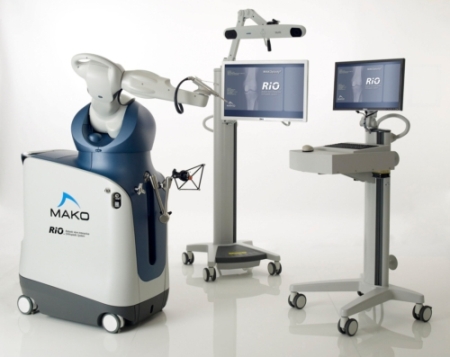Dec 14 2012
DMC Huron Valley-Sinai Hospital, one of nine hospitals and institutes operated by the Detroit Medical Center (DMC), announced today that it has performed MAKOplasty® partial knee resurfacing, a minimally invasive treatment option for adults living with early to mid-stage osteoarthritis that has not yet progressed to all three compartments of the knee. MAKOplasty is less invasive than traditional total knee surgery and is performed using RIO®, a highly advanced, surgeon controlled robotic arm system.
 DMC Huron Valley-Sinai Hospital's new MAKOplasty RIO, a highly advanced, surgeon controlled robotic arm system. (PRNewsFoto/DMC Huron Valley-Sinai Hospital)
DMC Huron Valley-Sinai Hospital's new MAKOplasty RIO, a highly advanced, surgeon controlled robotic arm system. (PRNewsFoto/DMC Huron Valley-Sinai Hospital)
MAKOplasty potentially offers the following benefits as compared to total knee surgery:
- Reduced pain;
- Minimal hospitalization;
- More rapid recovery;
- Less implant wear and loosening;
- Smaller scar;
- Better motion and a more natural feeling knee.
"We're thrilled to be only the second hospital in southeastern Michigan to have RIO available for the care of our patients. MAKOplasty allows us to treat patients with knee osteoarthritis(OA) at earlier stages and with greater precision. Because it is less invasive and preserves more of the patient's natural knee, the goal is for patients to have relief from their pain, gain back their knee motion and return to their daily activities," said HVSH's Dr. Roland Brandt , orthopaedic surgeon and Director of Sports Medicine.
Through its innovative use of technology, MAKOplasty takes partial knee resurfacing to a new level of precision.
The RIO® system enables the surgeon to complete a patient specific pre-surgical plan that details the technique for bone preparation and customized implant positioning using a CT scan of the patient's own knee. During the procedure, the system creates a three-dimensional, virtual view of the patient's bone surface and correlates the image to the pre-programmed surgical plan. As the surgeon uses the robotic arm, its tactile, auditory and visual feedback limits the bone preparation to the diseased areas and provides for real time adjustments and more optimal implant positioning and placement for each individual patient.
"Precision is key in planning and performing partial knee surgeries," said Dr. Brandt. "For a good outcome you need to align and position the implants just right. Precision in surgery, and in the pre-operative planning process, is what RIO can deliver, for each individual patient."
The opportunity for early intervention is important as OA is the most common form of arthritis and a leading cause of disability worldwide, according to the American Academy of Orthopaedic Surgeons.